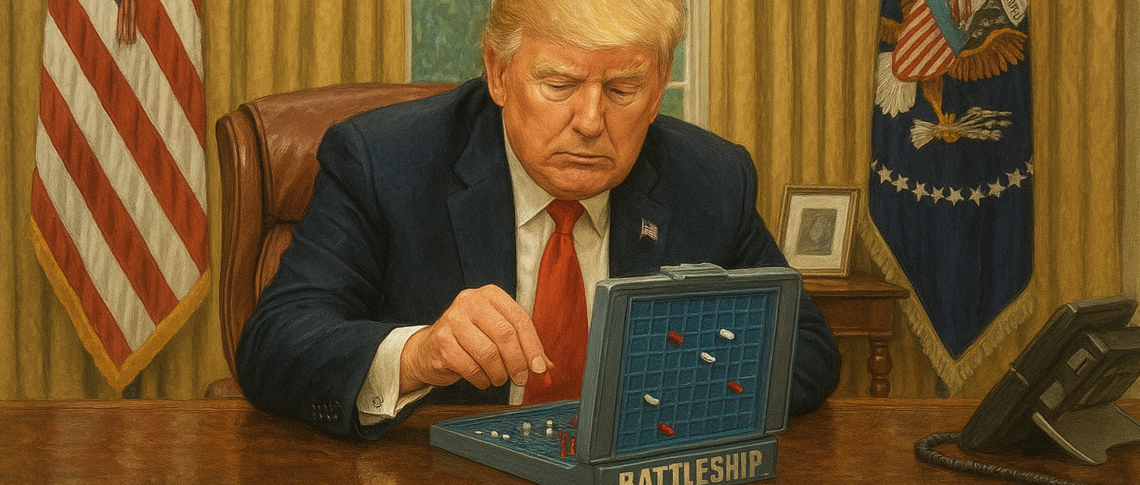A new dimension in the fight against drug cartels? A show of force in its own ‘backyard’? Or perhaps preparations for the overthrow of a dictator? What does the increased US military presence in the Caribbean Sea, which culminated in the strike on several speedboats in early September, mean?
A closer look at the situation reveals that the provocation has much more to do with the power constellation in the current US administration than with Latin America and the Caribbean.
Fight against drugs or perhaps regime change?
Analysts agree that US President Donald Trump’s ‘war on drugs’ is merely a pretext for military manoeuvres off the Venezuelan coast. Whoever wants to attack drug shipments normally does so along the main routes in Pacific waters and through raids in ports and airports, searching for containers or submarines rather than speedboats that at most transport small quantities to neighbouring islands. Apart from that, the use of military means in the fight against drug trafficking has never led to a solution in the past, but at most to a shift in trade routes and marketplaces. Even a former US ambassador to Panama, John Feeley, is quoted as saying: ‘We can shoot in self-defence, but we rarely do that because most narcos just give up.’
So what is behind the US military build-up in the Caribbean? Are the US rekindling their interest in their ‘backyard’, where for decades they covertly – and less covertly – supported military juntas and right-wing governments in the fight against communism in what was then a bipolar world? For a conventional invasion, such as the one in Panama in 1989, the approximately 4 000 marines mobilised, the P-8 spy planes and the deployed submarine would never be enough. Moreover, such a course of action would contradict the doctrine of the MAGA movement and the American president that US resources would no longer be used to save the world. The United States has had its day as the world’s policeman.
So, is this a deliberate provocation against Venezuela then? But why? The US has been cooperating fairly well with the Caribbean state thus far, with broad agreement on issues such as US company Chevron’s oil extraction in Venezuela and the deportation of migrants from the US.
What initially appears logical – replacing the illegitimate ruler with a legitimate one – becomes more complicated when one takes a closer look at the specific circumstances in Venezuela.
This is where Marco Rubio comes into play. The US Secretary of State has a clear political agenda against pseudo-socialist autocracies such as in Venezuela and Cuba. In an interview with Fox News, Rubio described Venezuelan leader Nicolás Maduro as a ‘fugitive of American justice’ and went on to say that the US was ‘not going to have a cartel, operating or masquerading as a government, operating in our own hemisphere.’ With that, Rubio is covering a sizeable electorate of exiled Latinos who share his desire for a firm hand against their countries of origin.
Since a ‘conventional’ invasion is ideologically and materially impossible, it helps to look at the events in Iran in June this year. The US attack on Iran’s nuclear facilities was precise and caused no significant ‘collateral damage’. In this way, the enemy is weakened or even eliminated, but no further plans for overthrow are pursued. The US leaves that up to the population, the opposition, the military or other forces in the country. If these are too weak, too fragmented or unable to seize the momentum for change, nothing more will follow: the US has demonstrated what it can do if it wants to — further efforts towards peace or democracy are not on the agenda.
Could such an attempt at regime change 2.0 be on the cards in Venezuela? Rubio, for his part, is in open contact with the conservative-liberal Venezuelan opposition leader Maria Corina Machado and the de facto winner of the 2024 presidential elections, Edmundo Gonzalez Urrutia. Whilst certainly not the driving forces behind Rubio’s actions, both support the vision of an ‘alternative to the current regime’. However, what initially appears logical – replacing the illegitimate ruler with a legitimate one – becomes more complicated when one takes a closer look at the specific circumstances in Venezuela.
What’s needed for a peaceful transition
On the one hand, the US remains ‘the gringo’ and is therefore unwelcome among large sections of the population — however difficult the situation in the country may be in terms of the economy, democracy and human rights. On the other hand, the political opposition is divided over the Machado/Gonzalez duo. Gonzalez is the nationally recognised winner of the 2024 election, but political leadership needs a solid base of several democratic actors to avoid going from bad to worse. Replacing one caudillo with another is not going to solve the country’s problems.
While there are democratic actors in civil society and political parties, they are weakened by ongoing repression and divided, particularly with regard to Machado and her positions. There also needs to be a willingness to shape a transition that includes dealing with the current power structure. As difficult as it is, especially for the victims of the regime, those who want a peaceful transition must offer those in power something in return for relinquishing or at least sharing their power. Gonzalez could be seen as playing a balancing role here, not so Machado.
In authoritarian contexts, an external attack has always been a welcome pretext for tightening internal control. Venezuela is no exception.
No one in diplomatic circles is willing to officially confirm the rumours of a potential military transitional government. It is conceivable that talks to this effect are being held with middle-ranking army officers. But the decades-long successful fragmentation of the military apparatus and the strengthening of various police security services alone argue against this. It is unlikely that a unified, stable force could emerge from this to take responsibility. The danger here is that if no one is prepared to shape a peaceful and democratic transition, other forces will fill the gap. Organised crime is flexible and seeks out areas where it can operate most undisturbed.
The unilateral provocation on the part of the US took other international representatives in Venezuela by surprise, as it did the global public. It shows that the US is not concerned with sustainable democratic change in Venezuela, but rather with allowing ‘Trump’s favourite’ Rubio, who is not only Secretary of State but also National Security Advisor, head of the now-abolished development agency USAID and entrusted with drafting security guarantees for Ukraine, to prove himself militarily and strategically. How far he can go in this regard remains to be seen. Even if ‘nothing’ happens, there will be no further consequences for the US. Venezuelans, however, will suffer even more repression and militarisation. In authoritarian contexts, an external attack has always been a welcome pretext for tightening internal control. Venezuela is no exception.
Meanwhile, regional reactions have been muted. The joint condemnation of the attack by 23 of the 33 member states of CELAC (Comunidad de Estados Latinoamericanos y Caribeños) cannot hide the fact that each state is seeking its own approach to the US. Charity begins at home. The US’ behaviour in international waters is condemned, but no head of state on the continent is standing up for the current Venezuelan leadership. However, there are also no signs of the region making any effort to (once again) promote negotiations and dialogue of any kind. As understandable as the reluctance is in view of the ultimately failed Barbados Agreement, which, in the run-up to the 2024 presidential elections, had negotiated democratic elections in exchange for the easing of sanctions under international leadership with the various political forces in Venezuela, it is also short-sighted. Even if ‘nothing’ happens, it means a lot for the region — namely, a further wave of refugees and migration and an unpredictable security risk on the continent's northern coast.






